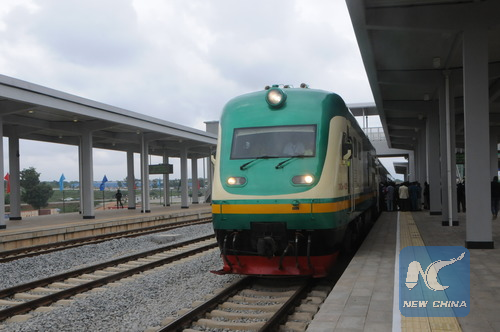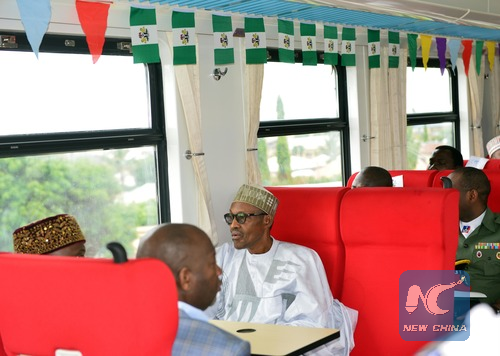Nigeria's first standard gauge railway marks 900 days of safe operation
2019-01-14 09:04:41
File photo shows a train at a train station in suburban Abuja, on July 26, 2016. (Xinhua/Yang Hongjie)
ABUJA, Jan. 13 (Xinhua) -- Passengers waiting to board a train from Nigeria's capital Abuja on Saturday were wowed when they were informed that the train service had been safely operating for 900 days.
A male voice announced from a public address system that the train service had been in commercial operation for 900 days and without any major accident recorded since its inception.
Many looked in amazement, expressing satisfaction at the safe operation of the Abuja-Kaduna train service, the first standard gauge railway in Nigeria and West Africa.
The train connects passengers from Idu, an industrial development area of Nigeria's capital city of Abuja, to Rigasa Village of Igabi local area of the northwestern state of Kaduna.
The Abuja-Kaduna train service started commercial operation on July 27, 2016, following the smooth completion of the railway construction by China Civil Engineering Construction Corporation (CCECC).
With the Nigerian Railway Corporation (NRC) being its main operator, local passengers lauded the CCECC and NRC for working together vigorously to achieve maximum safety with efficient operation.

File photo shows Nigerian President Muhammadu Buhari (C) in a passenger coach at a train station in suburban Abuja, on July 26, 2016. (Xinhua/Yang Hongjie)
Yakubu Garba, a regular passenger of the Abuja-Kaduna train service, described his experience so far as "topnotch."
"It is a wonderful experience. The number one advantage of the train is safety, because of the security challenges in Nigeria," Garba told Xinhua at the boarding gate of the main Idu Station of the train.
"When you enter the train you will feel safe. Also, businesses can be done between here and Kaduna in a day," the passenger said, referring to the comfort he feels using the train.
He also encouraged more Nigerians to use the train, especially those working in Abuja and residing in any of the satellite towns along the route of the train to "buy into this idea."
Garba said he has been more comfortable using the train since he observed that due to the security situation in the country, armed policemen are seen around the train stations and inside the train to ensure the safety of passengers.
"It is a commendable effort. I wish it will go around the country and we will be better for it," he said while going onboard the train.
Adamu Ahmed, a foreign tourist and first-time passenger of the train, said the train service gave him a first-time opportunity to see rural Nigeria as it connects to the urban areas in a safe and secure manner.
"This is my first trip on the train and I like it. It is very nice and interesting," said the Arab. "It is not so different from what I've seen back home in Saudi Arabia."
The Abuja-Kaduna rail line is one of the first Standard Gauge Railway Modernization Projects (SGRMP) undertaken in Nigeria. It is the first segment of the Lagos-Kano standard gauge project, which will link the commercial hub of Nigeria and the hub of economic activities in the northwest region of the country.
The railway modernization initiative in Nigeria aims at replacing the existing narrow gauge system with the wider standard gauge system while allowing high-speed train operations on the railway network.
In an interview with Xinhua, Fidet Okhiria, managing director of the NRC, said the patronage of the train service had increased greatly from the record of its first year.
Even the teething troubles it encountered had been addressed, just as the railway has opened up new settlements, making businesses to expand, and making it easier for passengers to move products from one place to another at a cheaper rate, and in safe conditions, Okhiria noted.
Only last month, over 80,000 passengers were transported on the Abuja-Kaduna train service, more than double of the passenger flow it previously recorded, the official said.
"The train service has opened the eyes of Nigerians," he said.
"We now get a lot of support from the people and the government because they are impressed with the progress of the train service even after three years of operation," he added.
- Previous:Tibet to strengthen railway construction in 2019
- Next:最后一页
